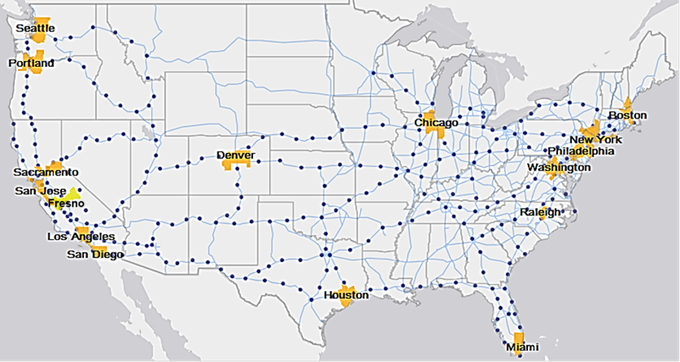GetOffYourGas
Well-known member
The Bolt is a great second-generation BEV. One of its biggest limitations, however, is charging on the road. It can charge reasonably fast, although it could be faster (the Model 3, by comparison, peaks out at about 2x the charge rate of the Bolt). And yet I think the larger problem is the lack of availability of chargers. My Bolt would be so much better if there was a CCS Network like Tesla's Supercharger Network. There is hope that this is coming.
GM has very publicly stayed out of the infrastructure game.
https://www.greencarreports.com/new...cs-fast-charging-sites-for-2017-chevy-bolt-ev
Meanwhile, BMW has teamed with Nissan to help spread CCS-capable quick chargers in many urban areas.
https://electrek.co/2017/01/24/bmw-nissan-dc-fast-charging-stations-electric-vehicles/
After the dieselgate fallout, VW was assigned large fines. Part of this money has been used to create Electrify America, which has big plans to roll out a nationwide CCS network.
https://insideevs.com/volkswagen-releases-electrify-america-plan/
Starting in Europe, a collaboration of BMW, Mercedes, Ford, and VW has formed Ionity to build out a CCS network. They recently announced plans to cover the continental US as well.
https://electrek.co/2018/02/06/map-ionity-ultra-fast-charging-network/
All in all, this shapes up to a very promising future. Let's use this thread to keep abreast of developments and share news/experiences.
GM has very publicly stayed out of the infrastructure game.
https://www.greencarreports.com/new...cs-fast-charging-sites-for-2017-chevy-bolt-ev
GreenCarReports said:From CEO Mary Barra: "We are not actively working on providing infrastructure [for the Bolt EV]."
Meanwhile, BMW has teamed with Nissan to help spread CCS-capable quick chargers in many urban areas.
https://electrek.co/2017/01/24/bmw-nissan-dc-fast-charging-stations-electric-vehicles/
Electrek said:While the stations are specially built for Nissan’s fleet of LEAFs and BMW’s fleet of i3s, the network is publicly available to all electric vehicles with CHAdeMO or SAE Combo (CCS) connectors.
After the dieselgate fallout, VW was assigned large fines. Part of this money has been used to create Electrify America, which has big plans to roll out a nationwide CCS network.
https://insideevs.com/volkswagen-releases-electrify-america-plan/
InsideEVs said:Following the Dieselgate scandal, Volkswagen was ordered to make significant investments into electric vehicles in the U.S. The vast majority of the investments were to be focused on charging infrastructure.
Starting in Europe, a collaboration of BMW, Mercedes, Ford, and VW has formed Ionity to build out a CCS network. They recently announced plans to cover the continental US as well.
https://electrek.co/2018/02/06/map-ionity-ultra-fast-charging-network/
Electrek said:This new network is believed by many to be the most important electric vehicle charging infrastructure effort since Tesla’s Supercharger network.
All in all, this shapes up to a very promising future. Let's use this thread to keep abreast of developments and share news/experiences.
















